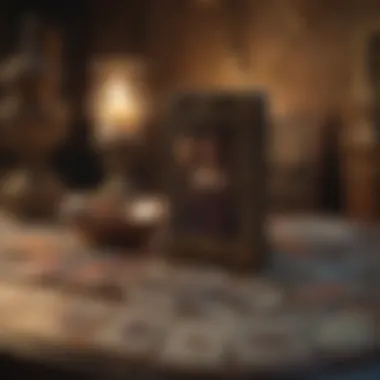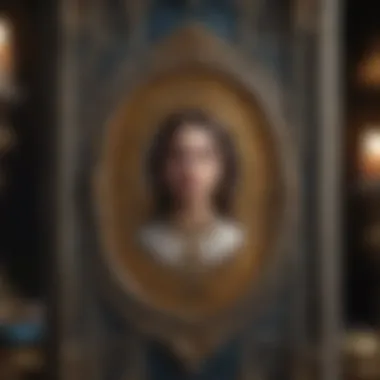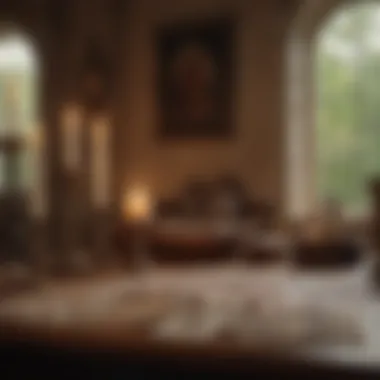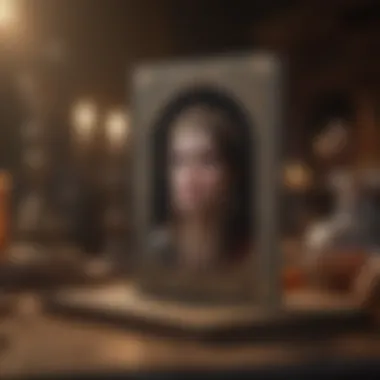Insightful Questions to Enhance Your Tarot Reading


Intro
Tarot readings are more than just a glimpse into the future; they are a tool for introspection and personal growth. To maximize the benefit of a tarot session, it is crucial to ask the right questions. This guide aims to enhance your tarot experience by helping you formulate insightful queries. It emphasizes the role of questions in interpreting the cards, allowing for deeper insights into personal development, relationships, and career aspirations.
Understanding how to frame your inquiries can fundamentally shift your perspective. Thoughtful questions spark profound interpretations and guide the energies present during a tarot reading. In this exploration, we will navigate various themes and guiding questions, enhancing your connection with tarot as a form of enlightenment.
Zodiac Sign Overview
General Traits
Each zodiac sign carries specific characteristics that can influence tarot interpretations. Knowing these traits can help you ask more targeted questions that resonate with your personality and situation. For instance, an Aries might be more inclined to seek answers that align with their assertive nature, while a Cancer may focus on emotional well-being.
Element and Modality
The elements—Fire, Earth, Air, and Water—along with modalities—Cardinal, Fixed, and Mutable—further elucidate the nature of each sign. Fire signs like Leo, Aries, and Sagittarius are driven by passion and energy. In contrast, Earth signs such as Taurus, Virgo, and Capricorn are grounded, practical, and realistic. Air signs (Gemini, Libra, Aquarius) communicate and think intellectually, while Water signs (Cancer, Scorpio, Pisces) are intuitive and emotional. These traits can shape the kinds of questions that will be most relevant in a reading.
Strengths and Weaknesses
Identifying your strengths and weaknesses as indicated by your zodiac sign can also serve as a focal point for inquiry. Consider questions that explore how you can leverage your strengths or mitigate your weaknesses. For example, a Scorpio might ask how to navigate their intense emotions constructively, while a Gemini could focus on how to maintain clarity in communication.
Understanding these elements allows you to craft questions that are aligned with your personal journey, resulting in clearer insights during your tarot readings.
“Questions pave the pathway for answers. Having a clear aim can transform the ethereal into tangible clarity.”
Identifying personal themes will enhance your tarot inquiry process. In the subsequent sections, the importance of detailed questions as they pertain to various life aspects will be articulated further.
Prologue to Tarot Reading
Tarot reading has gained significant traction in recent years. Many individuals approach tarot for various reasons such as guidance, insight, or even entertainment. Understanding the fundamentals of tarot is essential for anyone involved in these practices. This initial section introduces readers to the significance of tarot reading, laying the foundation for successful inquiries.
Understanding Tarot's Purpose
Tarot serves multiple purposes, with its core function being to provide insights that assist individuals in making informed decisions. Each card in the tarot deck carries unique symbolism and meaning, reflecting various aspects of human experience. The purpose of tarot is not strictly predictive; instead, it emphasizes self-reflection and understanding. While some seek answers to specific dilemmas, others find comfort in exploring broader life themes through the cards.
Engaging with tarot encourages users to consider their circumstances deeply. By interpreting the cards, individuals uncover hidden dynamics in their lives. This process facilitates personal growth, making tarot a valuable tool for introspection and awareness.
The Role of Questions in Tarot
Questions play a pivotal role in tarot readings. The effectiveness of a reading largely depends on the quality of the questions asked. Well-crafted inquiries can lead to deeper insights and more meaningful interpretations. It is vital to consider not just what is asked but also how it is posed.
Open-ended questions usually yield richer responses than closed ones. For example, asking "What can I learn from my current situation?" invites a broader exploration than simply inquiring, "Will I succeed?"
Asking effective questions also helps align the reader's intentions with the insights gained. When individuals approach tarot with clear and purposeful queries, they enhance their ability to engage with the findings meaningfully.
Formulating Effective Questions
Posing the right questions during a tarot reading is crucial for fostering a meaningful connection with the cards. Effective questions guide the reading, allowing for insight and clarity. When questions are well thought out, they can lead to deeper revelations about personal situations. This section will explore essential elements in formulating effective inquiries.
Open-Ended vs.
Closed Questions
Open-ended questions invite expansive answers, encouraging exploration of feelings, motivations, and potential outcomes. Examples include:
- What do I need to know about my current relationship?
- How can I better understand my life purpose?
Closed questions, however, limit responses, often resulting in a simple yes or no answer. For instance:
- Am I on the right path?
- Should I take that job?
While closed questions can still be useful for specific situations, they usually provide less depth. In tarot, open-ended queries allow for nuanced interpretations and broader revelations, making them generally more effective in guiding a reading.
Leading Questions: Pros and Cons
Leading questions can prompt specific responses and may simplify the reading process. For example:


- How will my choice affect my future? Such questions may help in getting direct answers. However, they can also bias the reading, as they may steer the interpretation toward a desired outcome.
The pros include:
- Efficiency in acquiring focused responses.
- Reduced ambiguity, leading to clearer readings.
The cons encompass:
- Potentially limiting the insights that can arise.
- Risk of frustration if the reading does not align with expectations.
Overall, balance is key. A mix of both leading and open inquiries can yield a richer experience.
Clarity and Specificity in Querying
Questions should be clear and specific, enhancing the reader's ability to connect with the tarot cards. Vague questions may lead to ambiguous answers, which can confuse rather than clarify. For example:
- Instead of asking, “What should I do?” specify: “What steps can I take to improve my career?”
Benefits of clarity include:
- Increased focus in readings.
- Better alignment between the reader's intent and the interpretation of the cards.
To achieve specificity, consider:
- Defining the context of your question.
- Identifying themes or concerns you wish to address.
Clear and specific queries open pathways to insight, allowing the tarot to reveal its wisdom effectively.
This section on formulating effective questions sets the foundation for meaningful tarot readings. By understanding the importance of question structure and intent, readers can engage more fully with their tarot experience.
Key Themes for Inquiry
Understanding the key themes for inquiry in tarot reading is essential. These themes provide a framework for asking questions that yield insightful responses. Each theme represents significant aspects of life, which can transform a general inquiry into a focused exploration. This approach encourages deeper reflection, aiding individuals in their quest for answers.
By aligning questions with these key themes, you can better navigate your personal journey and uncover hidden truths. Exploring these themes ensures that your tarot sessions are meaningful and targeted, enhancing the overall experience.
Personal Development and Growth
Personal development is a crucial theme in tarot reading. Questions about personal growth can lead to uncovering fears, strengths, and areas for improvement. Inquiring about personal development during a reading helps clarify one’s aspirations and obstacles.
Tarot can reveal patterns that might inhibit growth. It encourages introspection, prompting individuals to consider their motives and intentions. For instance, questions like "What are my greatest strengths that can support my growth?" or "What fears do I need to overcome to move forward?" can be powerful.
Relationships and Interpersonal Dynamics
Relationships are another significant theme in tarot. Questions focused on interpersonal dynamics can shine a light on communication barriers and feelings involved. Tarot readings can help illuminate relationship patterns and suggest paths to improve connections.
When framing questions about relationships, consider what specific aspects you want to understand better. Questions such as "How can I improve my communication with my partner?" or "What lessons should I learn from my past relationships?" offer insights directly relevant to enhancing emotional bonds.
Career and Professional Paths
The professional realm often evokes curiosity and concern. Tarot can provide clarity regarding career choices and paths. Questions in this theme can focus on career direction, job satisfaction, or workplace dynamics.
For example, asking "What career changes should I consider to align with my values?" or "How can I overcome challenges at work?" allows the tarot to guide you towards greater job fulfillment and success.
Health and Well-Being Journeys
Health and well-being represent a vital theme for holistic development. Questions in this area can encompass physical, emotional, and mental health aspects. Tarot readings may reveal underlying issues or promote awareness about needed changes.
Asking questions like "What do I need to focus on for better health?" or "How can I find balance in my life?" engages the tarot in a conversation about personal well-being and health management.
Life Purpose and Spiritual Exploration
Life purpose is a profound theme in tarot. Questions about one’s purpose can open avenues for greater understanding of personal calling and life’s meaning. By seeking clarity on this theme, individuals may confront existential questions and explore their spiritual journey.
Questions such as "What is my life purpose?" or "How can I align my actions with my spiritual path?" can bring forth insights that empower personal spirituality.
Engaging with these key themes through tarot reading encourages a holistic approach to personal inquiry. They provide a structured method to delve into complex life areas, ensuring the questions posed lead to enriching results.


Sample Questions for Tarot Readings
Asking the right questions during a tarot reading is central to unlocking the valuable insights that tarot cards can offer. Sample questions help individuals navigate their thoughts and concerns more effectively. The quality of your inquiry can influence both the depth and clarity of the reading. By preparing thoughtful queries, one can lead to greater self-discovery and understanding.
Questions for Personal Growth
Personal growth is a common focus in tarot readings. Questions in this domain can help you reflect and understand yourself better. A well-formulated question might be: What areas of my life require more attention for growth? This prompts the cards to reveal paths for improvement, guiding you on how to tackle challenges. Other questions include:
- How can I overcome self-doubt?
- In what ways can I cultivate more resilience?
Such questions allow for an introspective look at your feelings, choices, and potential growth trajectories.
Questions for Relationship Insights
Relationships are intricate and often challenging. Tarot can provide clarity regarding your interpersonal dynamics. For instance, asking What can I do to improve my relationships? opens a dialogue about potential actions you might take or behaviors you need to change. Other insightful questions are:
- How do my past experiences influence my current relationships?
- What is the underlying issue in my current partnership?
These questions help unearth the layers of your relational experiences, offering perspectives that encourage better connections and enrich your interactions.
Questions for Career Guidance
Career decisions impact life significantly. To leverage tarot effectively in this aspect, consider asking What direction should I take in my career? This guides the reading toward paths that may align more closely with your skills and aspirations. Possible additional questions might involve:
- What obstacles might I face in pursuing my career goals?
- How can I utilize my strengths to advance professionally?
Questions of this nature provide direction and can illuminate opportunities that may have been overlooked previously.
Questions for Health Advice
Health is a fundamental aspect of our lives. Tarot can also shine a light in this area. You might ask What changes should I make to enhance my well-being? Such a question invites an exploration of lifestyle factors affecting your health. Additional questions include:
- How can I better cope with stress and anxiety?
- What steps can I take toward a healthier lifestyle?
These queries can lead to insights that boost physical, mental, and emotional health.
Questions for Spiritual Clarity
Many seek tarot readings for spiritual growth and understanding. By posing questions like What do I need to learn from my current experiences? you invite deeper insights. Other relevant inquiries can be:
- How can I align my life with my true purpose?
- What spiritual practices may help me find inner peace?
This helps you connect with your spiritual side and explore avenues that may foster a richer spiritual life.
Sample questions serve as a bridge between mundane concerns and deeper existential inquiries, guiding individuals toward self-discovery.
Common Mistakes to Avoid
Understanding the common mistakes in tarot reading is crucial for enhancing both the experience and the effectiveness of the practice. Mistakes can lead to confusion, misinterpretation, and ultimately, dissatisfaction with the reading. Recognizing and avoiding these pitfalls will allow tarot enthusiasts to engage more deeply with the cards and their meanings. Moreover, reflecting on these issues can facilitate clearer communication during readings, ensuring that the seeker receives the insight they are looking for.
Vague and Ambiguous Questions
Vague and ambiguous questions pose significant challenges for tarot readings. When a question lacks clarity, it produces unclear or generalized responses. For example, asking, "What will happen in my future?" does not provide a focus point. Such openness can lead to interpretations that do not resonate fully with the seeker’s situation.
To avoid this, form questions that are direct and specific. A more effective approach would be, "What steps can I take to improve my relationship with my partner?" This specificity allows the tarot cards to guide the reading in a meaningful direction. Having defined and intentional questions can lead to insights that are more applicable and actionable for the seeker.
Overly Complex Queries
Overly complex queries can overwhelm both the reader and the seeker. When multiple themes are mixed together in one question, it creates a convoluted path of interpretation. For instance, asking, "What should I do about my job, my health, and my relationship problems?" overwhelms the reading.
Instead, it’s advisable to break down questions into manageable pieces. Approach each issue separately. Focus on one aspect at a time, like, "How can I address my job dissatisfaction?" This way, tarot readings can delve deeper into single concerns, resulting in clearer guidance and understanding. Complexity can dilute the significance of the cards drawn, making interpretations less impactful.
Asking for Definitive Answers
Asking for definitive answers undermines the essence of tarot as a reflective tool. Tarot offers insights and guidance, not certainties. Queries such as, "Will I get this job?" may imply that the cards can predict a specific outcome. This approach can lead to disappointment, especially if the reading does not align with the seeker’s expectations.
Instead of seeking absolutes, frame questions to explore possibilities. For example, consider asking, "What can I do to improve my chances of success in this job application?" This shifts the focus toward actions and personal growth, enhancing the value of the reading. Embracing tarot as a means to navigate life’s uncertainties fosters a richer, more rewarding experience.
Effective tarot reading hinges on the clarity of questions posed. Avoiding vague, complex, or absolute queries cultivates deeper understanding and connection with the tarot.
By being mindful of these common mistakes, tarot practitioners can create a more enriching environment for insights and connections with the cards.
The Importance of Intention in Tarot
In tarot reading, the concept of intention holds significant weight. Intentions act as a guiding force for both the reader and the querent. They shape the energy of the session and influence how the cards resonate with the individual's questions. A clear intention cultivates a focused atmosphere, allowing for more in-depth insights and relevant interpretations.


Establishing intent transforms a reading from a mere card layout into a meaningful exchange. When readers and querents approach tarot with purpose, the reading tends to align more closely with the individual's true concerns or inquiries. This practice not only enhances the experience but also fosters a more personal connection to the cards and their messages.
Consideration of intention encourages clarity in the psychic process. It leads to more thoughtful questions and reflections, enriching the dialogue during the reading.
Setting a Clear Intention
Setting a clear intention before a tarot reading lays the foundation for the session. It involves defining what you wish to gain from the reading. By articulating this aim, you help focus the energy and outcome.
To set your intention effectively, follow these steps:
- Reflect on Your Needs: Identify what areas of your life need insights. This could be relationships, career issues, or personal growth.
- Articulate Your Intention: Write down your intention in a clear and concise format. For example, instead of saying "I want to know about my future", frame it as "I seek guidance on how to navigate my current job challenges".
- Create a Ritual: Consider incorporating a small ritual, such as lighting a candle or making a few deep breaths. This can signal your brain to prepare for a focused session.
- Visualize the Outcome: Before drawing cards, take a moment to visualize the type of insights you hope to gain.
This practice does not only help clarify your queries but also opens the door to deeper layers of meaning in the readings.
Aligning Questions with Intentions
Aligning your questions with your intentions further enhances the effectiveness of a tarot session. When your inquiries reflect the core goals that have been set, the readings become more relevant and insightful.
To ensure your questions align well, consider the following:
- Contextual Relevance: Ensure that your questions relate directly to the intention. If your goal is to understand relationship dynamics, ask comparative questions about current partners rather than broad inquiries about love.
- Specificity: Aim for questions that are precise and detailed. This helps in drawing out clearer interpretations from the tarot. Questions like "What steps can I take to improve my relationship with my sister?" are more targeted than simply asking, "What about my family?"
- Open-Ended Format: Favor open-ended questions to allow for a broader exploration of insights. For example, instead of asking if a new job will succeed, ask, "What challenges might I face in transitioning to a new job?"
By maintaining this alignment, your tarot reading becomes a meaningful dialogue rather than a one-sided inquiry, ultimately leading to greater understanding and clarity in your life journey.
A well-set intention paired with thoughtfully aligned questions transforms tarot reading into a potent tool for personal insight.
Improving Your Tarot Skills
Improving your tarot skills can significantly enhance your readings. Understanding the nuances of tarot cards allows for deeper insights and clarity. Enhanced skills lead to more meaningful experiences, whether for yourself or others. Practicing consistently develops intuition and helps in grasping the essence of the cards. It forms a foundation for advancing your tarot journey and fosters a stronger connection to the imagery and symbolism within the deck.
Practicing with Different Scenarios
To raise your tarot skills, practice in varied scenarios is crucial. This approach allows you to see how different questions or situations can influence card interpretation. For instance, iving readings for friends and family offers personal perspectives. Each individual brings unique energy and influences the reading's depth. Moreover, practicing in groups creates a dynamic where feedback is immediate and collaborative.
Try setting specific themes for each session to focus your learning. For example, dedicate one session to relationship inquiries and another to career-focused questions. By diving into these different themes, you become more adept at recognizing patterns and drawing connections between the cards.
Self-Reflection After Readings
Self-reflection post-reading is vital in improving your tarot capabilities. Taking time to analyze your readings can lead to significant insights. Reflecting on what worked and what didn't encourages growth. Ask yourself questions like: What feelings did the cards evoke? or Did the interpretation resonate with the situation?
Consider keeping a tarot journal. In it, you can document the questions posed, the cards drawn, and your interpretations. Over time, this record becomes a valuable resource. It aids in tracking progress and recognizing recurring themes or errors. This method enhances your understanding of both the cards and your intuitive abilities.
“Reflective practice is the key to growth in any field.”
Improving your tarot skills through diligent practice and self-reflection doesn't just benefit your readings. It enriches your personal journey as well, bringing you closer to understanding the tarot’s transformative potential.
End: The Quest for Insight
The process of tarot reading is fundamentally about seeking clarity and understanding in various aspects of life. In this article, we have explored the significance of asking the right questions during a tarot session. These queries serve as a guiding light, helping individuals navigate through complex situations and uncover deeper insights. It is essential to recognize that the questions posed significantly shape the reading's outcome, influencing the direction of the interpretation.
Engaging with tarot is not merely about fortune-telling. It is an intricate dance of intuition and inquiry. The importance of framing precise questions cannot be overstated. By honing in on areas of interest, you allow the cards to resonate more effectively with your specific circumstances, enhancing the reading's relevance.
Benefits of Insightful Questioning:
- Clarity and Focus: Well-structured questions enable clearer answers. They help avoid ambiguity, guiding the readings toward specific themes that matter most to you.
- Personal Growth: As the reading unfolds, thoughtful questions can catalyze a process of self-discovery, promoting a deeper understanding of your motivations and desires.
- Empowerment: Understanding the outcomes of your inquiries can empower you to take informed actions based on the insights gained, leading to positive changes in personal and professional spheres.
"Tarot is like a mirror reflecting the inner self; the questions you ask determine what you see."
Moreover, the tarot journey is one of continuous evolution. As you grow, your questions may shift in complexity and focus, reflecting your changing life circumstances. Thus, the cycle of inquiry should be adaptive, allowing for a dynamic interaction with the tarot.
Embracing the Process
The act of engaging with tarot is inherently a personal journey. The process requires patience and an open mind. Each reading gives an opportunity to reflect on one's life and decisions. Embracing this process means being present during the reading and allowing the insights to resonate without immediate judgment. It is essential to accept what the cards reveal, even if they don't align with expectations.
Each question should be viewed as a stepping stone toward greater self-awareness. The unfolding narrative of your tarot reading offers a pathway to navigate uncertainties. Therefore, acknowledge and embrace the natural flow of the session, understanding that true insight comes from both the questions and the answers.
Continuous Learning in Tarot Practice
The world of tarot is vast, and venturing into it requires a commitment to continuous learning. Each reading, whether personal or with others, serves as a lesson. Reflection post-reading can yield beneficial insights about both the cards and the process itself. Note what worked well and areas that may need adjustment for future inquiries.
Joining tarot communities can also enhance your learning experience. Engaging with fellow enthusiasts on platforms like Reddit or Facebook can expose you to diverse perspectives and new approaches to querying. This can deepen your understanding and foster a richer relationship with tarot.
In summary, your quest for insight through tarot is ongoing. By embracing the process and committing to continuous learning, you can enhance your skills and develop a more profound connection with this ancient tool for enlightenment.







